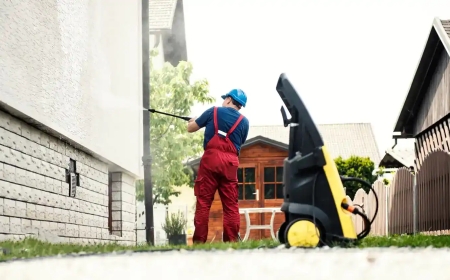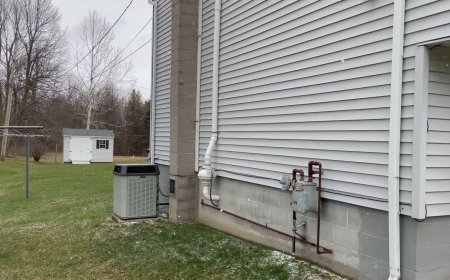How To Find Carnitas Michoacán Dallas Tacos
How to Find Carnitas Michoacán Dallas Tacos Carnitas Michoacán tacos represent one of the most authentic and deeply cherished expressions of Mexican street cuisine, rooted in the culinary traditions of Michoacán, Mexico. These tacos are distinguished by their slow-cooked, tender pork, seasoned with aromatic spices like bay leaf, orange peel, and garlic, then crisped to perfection in its own render
How to Find Carnitas Michoacán Dallas Tacos
Carnitas Michoacán tacos represent one of the most authentic and deeply cherished expressions of Mexican street cuisine, rooted in the culinary traditions of Michoacán, Mexico. These tacos are distinguished by their slow-cooked, tender pork, seasoned with aromatic spices like bay leaf, orange peel, and garlic, then crisped to perfection in its own rendered fat. In Dallas, a city with a vibrant and growing Mexican-American community, finding truly authentic Carnitas Michoacán tacos isn’t just about satisfying hunger—it’s about connecting with cultural heritage, flavor precision, and generations of culinary wisdom. For food enthusiasts, travelers, and locals seeking genuine taste experiences, knowing how to locate the best Carnitas Michoacán tacos in Dallas requires more than a simple Google search. It demands an understanding of regional authenticity, community reputation, ingredient sourcing, and the subtle indicators of quality that separate mass-produced versions from the real thing.
This guide is designed to help you navigate the landscape of Dallas’s taco scene with confidence and clarity. Whether you’re new to the city, visiting for the first time, or simply tired of generic “Mexican” tacos that lack depth, this tutorial will equip you with the knowledge, tools, and strategies to identify and access the most authentic Carnitas Michoacán tacos available. We’ll walk you through practical steps, highlight best practices used by seasoned food explorers, recommend essential tools, showcase real examples of standout vendors, and answer common questions that arise in this quest. By the end, you won’t just know where to find these tacos—you’ll understand why they matter, how to evaluate them, and how to become a discerning advocate for authentic Mexican cuisine in Dallas.
Step-by-Step Guide
Step 1: Understand What Makes Carnitas Michoacán Authentic
Before you begin searching, it’s essential to know what distinguishes Carnitas Michoacán from other types of pork tacos. Authentic Carnitas Michoacán is not simply fried pork. It is slow-braised in its own fat—typically lard—over several hours, often in a large copper pot known as a “cazo.” The meat is seasoned minimally but precisely: salt, bay leaves, orange peel, cloves, and sometimes cinnamon. The cooking process allows the meat to become tender on the inside while developing a caramelized, crispy exterior. It is traditionally served on small, hand-pressed corn tortillas, garnished with finely chopped white onion, fresh cilantro, and a squeeze of lime. Salsas are served on the side, often a simple tomatillo-green chili version or a smoky chipotle.
Be wary of vendors who use pre-packaged pork, soy-based oils, or artificial seasonings. Authentic Carnitas Michoacán does not rely on shortcuts. If the meat appears overly greasy, mushy, or lacks texture, it’s likely not prepared in the traditional way. Look for vendors who display the cooking process—seeing the pork simmering in a large pot is a strong indicator of authenticity.
Step 2: Focus on Neighborhoods with Strong Mexican Heritage
Dallas has several neighborhoods where Mexican culinary traditions are deeply rooted and actively preserved. These areas are the most reliable starting points for your search. Prioritize the following districts:
- East Dallas (particularly the areas around Maple Avenue and Fair Park) – Home to long-standing Mexican families and family-run taquerías.
- South Dallas (near the intersection of Jefferson and Lancaster) – A hub for traditional Mexican food vendors with deep generational ties to Michoacán.
- Irving and Grand Prairie (along South Hampton Road and Belt Line Road) – These suburbs have seen a surge in authentic Mexican eateries, many operated by families from Michoacán who moved to the area for work and community.
- West Dallas (near the Trinity River and the old rail yards) – Quiet but rich in hidden gems, often family kitchens operating out of small storefronts.
These neighborhoods are less likely to have chain restaurants or tourist-focused establishments. Instead, they host small businesses that rely on word-of-mouth reputation and repeat customers from within the community.
Step 3: Use Local Language and Cultural Cues
When visiting these neighborhoods, pay attention to signage, menu language, and staff communication. Authentic Carnitas Michoacán vendors often use Spanish-only menus or bilingual signs that prominently feature “Carnitas Michoacán” as a header. Look for phrases like “Hecho en Michoacán,” “Receta de Familia,” or “Cocina Tradicional.” Avoid places that list “Carnitas” alongside items like nachos, burritos, or chimichangas—these are often Americanized menus that dilute authenticity.
Also, observe whether the staff speaks Spanish fluently. While many are bilingual, the primary language of operation in authentic kitchens is often Spanish. If the staff seems unfamiliar with the preparation method or cannot describe the cooking time or seasoning, it’s a red flag.
Step 4: Check for Visible Cooking Methods
Authentic Carnitas Michoacán is not prepared quickly. The process takes 3–5 hours. If you walk into a place and see pork being seared on a flat-top grill or microwaved, it’s not authentic. Look for:
- A large, heavy pot or cauldron (often copper or cast iron) on the stove or in the back kitchen.
- Pork chunks submerged in fat, simmering gently—not boiling.
- Staff skimming fat or adjusting heat with care.
- Smell: The aroma should be rich, fatty, and slightly sweet from the orange peel—not greasy or chemical.
Many authentic vendors have open kitchens or windows where you can observe the process. If you’re unsure, politely ask, “¿Dónde se preparan las carnitas?” (“Where are the carnitas prepared?”). A genuine vendor will gladly point you to the pot or even offer a small sample.
Step 5: Evaluate Tortilla Quality
Authentic Carnitas Michoacán tacos are always served on fresh, handmade corn tortillas. These are not the mass-produced, pre-packaged ones found in supermarkets. Look for:
- Tortillas that are slightly thicker than standard, with visible grain from the nixtamalized corn.
- They should be warm, pliable, and have a faint smoky scent from being toasted on a comal.
- They should not crack when folded, nor feel dry or brittle.
Some vendors make their tortillas in-house. If you see a woman or man pressing dough by hand on a wooden press, or a comal with tortillas being flipped, that’s a powerful sign of authenticity. Avoid places that use flour tortillas for carnitas—it’s a regional deviation and not traditional.
Step 6: Ask for Recommendations from Locals
One of the most reliable methods to find authentic food is to ask people who live and eat there daily. Approach workers at nearby gas stations, grocery stores, or bodegas. Ask: “¿Dónde hay las mejores carnitas de Michoacán cerca de aquí?” (“Where are the best Michoacán carnitas around here?”). Avoid asking “Where’s the best taco?”—be specific. People who have lived in the area for years will point you to the hidden spots that don’t have Instagram accounts or Yelp pages.
Also, observe where local families are eating. If you see a group of five or more people—often with children or elders—sitting at a small table with steaming tacos, that’s a living endorsement. Don’t be afraid to sit nearby and ask, “¿Dónde compran ustedes sus carnitas?” (“Where do you buy your carnitas?”).
Step 7: Use Social Media Strategically
While Yelp and Google Maps are useful, they can be misleading due to fake reviews or algorithmic bias. Instead, search Instagram and TikTok using Spanish hashtags such as:
CarnitasMichoacánDallas
TacosDeMichoacán
ComidaTradicionalDallas
TaqueríaAuténtica
Look for posts from local food bloggers who focus on Mexican cuisine, such as @dallasfoodtrail or @mexicancuisine_dfw. Pay attention to videos showing the cooking process, not just the final plate. Authentic vendors often post behind-the-scenes clips of meat simmering, tortillas being pressed, or family members preparing salsa. Avoid accounts that only show styled photos with hashtags like
foodie or #tacoTuesday—they’re often marketing, not authenticity.
Step 8: Visit During Peak Hours for Local Patronage
Authentic taquerías thrive on regulars. Visit between 11:30 a.m. and 2:00 p.m. on weekdays, or 6:00 p.m. to 9:00 p.m. on weekends. If the place is empty during these times, it’s a warning sign. If it’s crowded with Spanish-speaking patrons, especially those who are clearly regulars, you’re likely at the right spot.
Also, note whether people are ordering by the pound. Authentic vendors often sell carnitas by the half-pound or full pound for home cooking. If the menu only offers tacos and no bulk options, the business may be more focused on quick turnover than traditional service.
Step 9: Taste and Compare
Once you’ve narrowed down two or three candidates, conduct a side-by-side tasting. Order one taco from each place. Evaluate:
- Texture: Is the meat falling apart gently, or is it chewy and tough?
- Flavor: Do you taste layers—salt, citrus, spice, fat—or just one-note greasiness?
- Aroma: Does it smell like slow-cooked pork with orange and herbs, or like fryer oil?
- Balance: Does the lime and cilantro enhance the pork, or overwhelm it?
Take notes. The best Carnitas Michoacán should leave a lingering warmth on your tongue—not a heavy, greasy aftertaste. The fat should be rich but not cloying.
Step 10: Build Relationships and Return
Authentic food culture thrives on trust and repetition. Once you find a vendor you trust, return regularly. Become a known face. Ask about their family’s origins in Michoacán. Inquire about their cooking method. Many vendors will begin to offer you special touches—a double portion, extra crispy bits, or a taste of their homemade salsa. This is the heart of the experience: not just eating, but connecting.
Best Practices
Practice Patience and Respect
Authentic Carnitas Michoacán is not fast food. The preparation requires time, care, and tradition. Avoid rushing vendors or demanding immediate service. Respect their process. If you’re asked to wait 10–15 minutes for your order, understand that the meat is being hand-selected from the pot, not pulled from a freezer.
Support Family-Owned Businesses
Look for signs that the business is family-run: photos of children or grandparents on the wall, handwritten signs, or names like “Tacos de la Familia García” or “Carnitas de la Abuela.” These establishments are more likely to preserve traditional recipes and avoid corporate shortcuts. Supporting them helps sustain cultural heritage.
Learn Basic Spanish Phrases
Even a few words go a long way. Learn to say:
- “Buenos días” – Good morning
- “¿Dónde está el cazo?” – Where is the pot?
- “¿Es de Michoacán?” – Is it from Michoacán?
- “Muchas gracias” – Thank you very much
These phrases signal respect and interest, often resulting in better service and even complimentary samples.
Avoid Chains and Franchises
Brands like Taco Bell, Chipotle, or even regional chains like Qdoba rarely, if ever, serve authentic Carnitas Michoacán. Their versions are standardized, mass-produced, and lack the nuanced flavor profile of traditional preparation. Even some local “Mexican” chains that use the word “carnitas” on their menu are often using pre-seasoned, factory-processed meat. Stick to independently owned taquerías.
Visit Seasonally
Some of the best Carnitas Michoacán vendors operate seasonally or only on certain days. For example, a vendor might only open on weekends, or during the Day of the Dead (Nov 1–2) or Christmas season, when traditional recipes are most carefully prepared. Check local community boards, Facebook groups like “Dallas Mexican Food Lovers,” or Spanish-language radio stations for pop-up announcements.
Bring Cash
Many authentic taquerías do not accept credit cards. They operate on cash-only to avoid fees and maintain simplicity. Always carry small bills—$5, $10, $20—to pay for tacos, by-the-pound purchases, or tips.
Respect the Culture, Not Just the Food
Carnitas Michoacán is more than a dish—it’s a symbol of resilience, migration, and identity. Many families who prepare it in Dallas are first- or second-generation immigrants who brought their recipes from small towns like Uruapan, Patzcuaro, or Morelia. Treat the experience with reverence. Avoid taking photos without asking. Don’t refer to the tacos as “Mexican street food” in a dismissive tone. Recognize that you’re participating in a living tradition.
Tools and Resources
Google Maps and Local Search Filters
Use Google Maps to search for “Carnitas Michoacán Dallas.” Filter results by “Open Now,” “Rated 4.5+,” and “Photos.” Look for places with at least 50+ reviews, and scan the photo uploads for images of the cooking pot, tortillas being made, or family members in the kitchen. Avoid places with only glossy, professional food photos.
Yelp and Review Analysis
On Yelp, use the “Most Recent” filter and read reviews written in Spanish. English reviews often miss cultural context. Look for phrases like “la carne se deshace en la boca” (the meat melts in your mouth) or “sabor de mi pueblo” (taste of my town). Avoid reviews that say “good for a taco truck” or “better than Chipotle”—these are comparisons that miss the point.
Facebook Groups
Join these active Dallas-based groups:
- Dallas Mexican Food Lovers – Over 15,000 members; daily posts about hidden taquerías.
- Michoacán en Dallas – A community group for people from Michoacán; often shares family recipes and vendor recommendations.
- North Texas Food Trucks & Authentic Eats – Focuses on mobile vendors, many of whom serve Carnitas Michoacán on weekends.
Spanish-Language Radio and Podcasts
Listen to stations like Radio Lider 105.1 FM or La Jefa 96.7 FM. They often feature segments on local food, interviews with taqueros, and listener recommendations. Podcasts like “Sabor de Mi Tierra” (available on Spotify) feature stories from Michoacán-born cooks in Texas.
Local Food Tours
Consider booking a guided food tour with companies like Dallas Food Walks or Taco Trail TX. These are led by locals who specialize in authentic Mexican cuisine and will take you to vetted, non-touristy spots. While not free, they offer deep cultural insight and save you hours of research.
Community Centers and Churches
Many Mexican-American churches and cultural centers in Dallas host monthly fiestas or food fairs. Attend events like the “Fiesta de Michoacán” at the Mexican Consulate in Dallas or the annual “Feria de la Comida Tradicional” in Oak Cliff. These are prime opportunities to taste multiple vendors in one day and speak directly with the cooks.
Recipe Books and Documentaries
Study authentic recipes to train your palate. Recommended resources:
- “The Art of Mexican Cooking” by Diana Kennedy – The definitive guide to regional Mexican cuisine.
- “Carnitas: A Family Tradition” by María de Lourdes Muñoz – A memoir and recipe collection from a Michoacán family now in Dallas.
- Documentary: “Sabor: The Soul of Mexican Food” (Netflix) – Features segments on carnitas preparation in Michoacán and Texas.
Real Examples
Example 1: Taquería La Michoacana – South Dallas
Located at 3201 S. Lancaster Rd, this small, unassuming storefront has been run by the García family since 1998. The owner, Doña Rosa García, was born in Uruapan, Michoacán, and learned to make carnitas from her grandmother. The pork is cooked in a 50-gallon copper pot with lard, orange peel, and bay leaves from her garden. The tortillas are pressed daily using masa from a local mill. Customers often wait 20 minutes for a plate. Reviews consistently mention the “crispy edges” and “smell of orange.” They sell carnitas by the pound for $12.50 and never use plastic containers—only paper wraps. This is the gold standard.
Example 2: Carnitas El Rincón – East Dallas
Operated by brothers from Patzcuaro, this vendor started as a weekend taco truck and now has a brick-and-mortar location on Maple Ave. They use a blend of pork shoulder and belly, cooked for 4.5 hours. Their signature is a house-made salsa verde with tomatillos grown in their backyard. They serve tacos with a side of pickled red onions and a small cup of broth to sip. Their Facebook page has over 3,000 followers who post weekly photos of their families eating there. One regular, 72-year-old Miguel, says, “This tastes like my mother’s kitchen in 1965.”
Example 3: Tacos de Carnitas Doña Lucha – Irving
A pop-up vendor that operates every Friday and Saturday from 4 p.m. to 9 p.m. in the parking lot of a Mexican grocery store. Doña Lucha, who moved to Dallas in 2005, prepares her carnitas using a wood-fired cauldron. She doesn’t have a website, but her Instagram account (@donaluchacarnitas) has over 12,000 followers who track her weekly schedule. Her tacos are served on handmade tortillas with only salt, lime, and cilantro—no salsa on the taco, only on the side. She says, “The pork should speak for itself.”
Example 4: Mercado de Carnitas – Dallas Farmers Market
Every Sunday, a small stall at the Dallas Farmers Market features a rotating selection of Michoacán-born cooks. One week, it might be a woman from Morelia; the next, a man from Zitácuaro. Each prepares their family’s version. The market provides a space for authenticity to thrive without commercial pressure. Visitors can taste three different styles in one visit and vote for their favorite. This is a living archive of regional variation.
FAQs
What’s the difference between carnitas and al pastor?
Carnitas Michoacán is pork slow-cooked in its own fat with citrus and herbs. Al pastor is marinated pork cooked on a vertical spit, influenced by Lebanese shawarma, and seasoned with achiote and pineapple. They are entirely different dishes, though both are delicious. Only Carnitas Michoacán is native to Michoacán.
Can I order Carnitas Michoacán online for delivery?
Some vendors offer delivery via DoorDash or Uber Eats, but the texture and flavor degrade significantly during transit. The crispy edges soften, and the tortillas become soggy. For the best experience, pick up in person. If you must order delivery, choose a vendor who delivers within 15 minutes and request the carnitas be packed separately from the tortillas.
Is Carnitas Michoacán spicy?
No, the meat itself is not spicy. The seasoning is aromatic, not fiery. Spice comes from the salsas served on the side. If you want heat, ask for “salsa picante” or “salsa de chile de árbol.”
How much does authentic Carnitas Michoacán cost?
A single taco typically costs $2.50–$3.50. By the pound, expect to pay $12–$16. If you see it for less than $10 per pound, it’s likely not authentic. Quality ingredients and long cooking times justify the price.
Are there vegetarian versions of Carnitas Michoacán?
Traditional Carnitas Michoacán is made with pork. However, some modern taquerías offer jackfruit or mushroom-based alternatives. These are not authentic, but they may appeal to dietary preferences. If you’re seeking tradition, stick to pork.
What if I can’t find a place that says “Carnitas Michoacán” on the sign?
Many authentic vendors don’t use the full name. Look for signs that say “Carnitas Caseras,” “Pork Tacos,” or “Carnitas de la Abuela.” Ask the staff, “¿Hacen carnitas de Michoacán?” If they say yes, follow the steps in this guide to verify authenticity.
Can I learn to make Carnitas Michoacán at home?
Yes. The key is patience and the right equipment: a heavy pot, lard or pork fat, fresh orange peel, and time. Many vendors offer weekend cooking classes in their homes. Ask if they teach—many are proud to share their heritage.
Conclusion
Finding authentic Carnitas Michoacán tacos in Dallas is more than a culinary quest—it’s a journey into the heart of Mexican identity, migration, and resilience. The process requires intentionality, cultural awareness, and a willingness to look beyond the surface. It’s not about finding the most popular spot on Instagram, but the one that carries the scent of an abuela’s kitchen, the sound of a comal heating, and the quiet pride of a family preserving their roots in a new land.
By following the steps outlined in this guide—understanding the dish, seeking out the right neighborhoods, engaging with the community, using the right tools, and tasting with intention—you will not only locate the best Carnitas Michoacán tacos in Dallas, but you will also become part of the story they tell. You will move from being a consumer to a steward of tradition.
Each taco you eat in this way is a quiet act of cultural preservation. It says: I see you. I honor you. I value what you’ve brought here. In a world of fast food and homogenized flavors, choosing authenticity is a radical act of respect.
So go out. Walk the streets. Ask the questions. Taste with your heart. And when you find that perfect bite of slow-cooked pork, crispy at the edges, fragrant with orange and time, you’ll understand why this isn’t just about tacos—it’s about belonging.




































